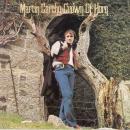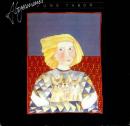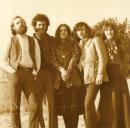Our captain cried, All hands and away tomorrow,
Leaving these girls behind in grief and sorrow.
What makes you go abroad, fighting for strangers
When you could stop at home, free from all dangers?
You courted me a while just to deceive me
Now my heart you have gained, and you means to leave me
Saying, There's no belief in men, not my own brother
So girls if you can love, love one another
When I had gold in store oh you did invite me
And now I'm low and poor you seems to slight me
Dry off your brandy tears and leave off weeping
For happy we shall be at our next meeting
Oh I'll roll you in my arms, me dearest jewel.
So stay at home with me and don't be cruel
She fell down on the ground like one was dying;
This house was full of grief, sighing and crying.
Farewell me dearest friends, father and mother
I am your only child, and I have no brother
It's in vain to weep for me for I am going
To where the lasting joy's with fountains flowing
Leaving these girls behind in grief and sorrow.
What makes you go abroad, fighting for strangers
When you could stop at home, free from all dangers?
You courted me a while just to deceive me
Now my heart you have gained, and you means to leave me
Saying, There's no belief in men, not my own brother
So girls if you can love, love one another
When I had gold in store oh you did invite me
And now I'm low and poor you seems to slight me
Dry off your brandy tears and leave off weeping
For happy we shall be at our next meeting
Oh I'll roll you in my arms, me dearest jewel.
So stay at home with me and don't be cruel
She fell down on the ground like one was dying;
This house was full of grief, sighing and crying.
Farewell me dearest friends, father and mother
I am your only child, and I have no brother
It's in vain to weep for me for I am going
To where the lasting joy's with fountains flowing
Language: English
Versione cantata da June Tabor
June Tabor's version
June Tabor's version
OUR CAPTAIN CRIED ALL HANDS
Our captain cried, All hands and away tomorrow,
Leaving us poor girls behind in grief and sorrow.
What makes you go abroad, fighting for strangers
When you could stay at home, free from all dangers?
I'd roll you in my arms, my dearest jewel.
So stay at home with me and don't be cruel.
She fell down on the floor like one that was dying;
This house was filled with grief, crying and sighing.
You courted me a while just to deceive me
But now my heart you've won, oh, you mean to leave me.
Dry off your briny tears and cease yout weeping,
It's happy we shall be at our next meeting.
When I had gold in store you did invite me,
But now I'm low and poor, oh, you mean to slight me.
I'll put no trust in men, not in my own brother,
It's maids, if you would love, love one each other.
Our captain cried, All hands and away tomorrow,
Leaving us poor girls behind in grief and sorrow.
What makes you go abroad, fighting for strangers
When you could stay at home, free from all dangers?
I'd roll you in my arms, my dearest jewel.
So stay at home with me and don't be cruel.
She fell down on the floor like one that was dying;
This house was filled with grief, crying and sighing.
You courted me a while just to deceive me
But now my heart you've won, oh, you mean to leave me.
Dry off your briny tears and cease yout weeping,
It's happy we shall be at our next meeting.
When I had gold in store you did invite me,
But now I'm low and poor, oh, you mean to slight me.
I'll put no trust in men, not in my own brother,
It's maids, if you would love, love one each other.
Language: English
La versione cantata dai New St. George:
Oh the captain cried all hands, and away tomorrow
Leaving my dearest dear in grief and sorrow
Dry up your briny tears and leave off weeping
How happy shall we be at our next meeting
How can you go away and fight for strangers
You’d better stay at home, here out of danger
I’d roll you in my arms my dearest jewel
So stay at home with me and don’t be cruel
When I had gold in store you seemed to like me
Now that I’m low and poor you do despise me
You courted me a while just to deceive me
Now my poor heart you’ve won, and you’re going to leave me
Down on the ground she fell like one a-dying
Tearing her arms abroad sobbing and sighing
There’s no believing man, not your own brother
So girls if you must love, love one another
Farewell my dearest friends, Father and Mother
I am your only child, you have no other
Tis vain to weep for me, for I am going
The lad I loved so well has been my ruin
Oh the captain cried all hands, and away tomorrow
Leaving my dearest dear in grief and sorrow
Dry up your briny tears and leave off weeping
How happy we will be at our next meeting
Leaving my dearest dear in grief and sorrow
Dry up your briny tears and leave off weeping
How happy shall we be at our next meeting
How can you go away and fight for strangers
You’d better stay at home, here out of danger
I’d roll you in my arms my dearest jewel
So stay at home with me and don’t be cruel
When I had gold in store you seemed to like me
Now that I’m low and poor you do despise me
You courted me a while just to deceive me
Now my poor heart you’ve won, and you’re going to leave me
Down on the ground she fell like one a-dying
Tearing her arms abroad sobbing and sighing
There’s no believing man, not your own brother
So girls if you must love, love one another
Farewell my dearest friends, Father and Mother
I am your only child, you have no other
Tis vain to weep for me, for I am going
The lad I loved so well has been my ruin
Oh the captain cried all hands, and away tomorrow
Leaving my dearest dear in grief and sorrow
Dry up your briny tears and leave off weeping
How happy we will be at our next meeting
Contributed by Riccardo Venturi - 2007/1/23 - 17:35
Dave Swarbrick era già stato dato per morto nel 1999, quando il quotidiano britannico "Daily Telegraph" ne aveva annunciato il decesso per poi smentirsi il giorno seguente.
Questa volta, purtroppo, la notizia della scomparsa del musicista è vera e confermata: la morte è avvenuta venerdì 3 giugno, per ragioni probabilmente connesse all'enfisema di cui Dave Swarbrick soffriva da molti anni.
Nato il 5 aprile del 1941 nei dintorni di Londra, si era poi trasferito con la famiglia nello Yorkshiore del nord, dove aveva imparato a suonare il violino. Aveva iniziato a farlo professionalmente nel 1960 con il Campbell Folk Group, poi collaborando con Martin Carthy per parecchi dischi fra il 1965 e il 1968. Session man molto richiesto - oltre al violino, suonava viola, mandolino, mandola e chitarra - fu chiamato a partecipare alla registrazione di "A sailor's life" per i Fairport Convention nell'album del 1969 "Unhalfbricking", e gli fu chiesto di entrare nella band.
Dave Swarbrick fu il primo violinista della scena folk britannica a suonare il violino elettrificato. La sua militanza nei Fairport Convention - culminata nella creazione della folk opera "Babbacombe Lee" - non gli impedì si pubblicare numerosi lavori da solista e di collaborare con tutti i principali esponenti del folk britannico. La band si sciolse nel 1979, e Swarbrick continuò l'attività musicale da solista continuando a collaborare a molteplici progetti discografici.
A causa delle condizioni di salute - soffriva di enfisema - che nell'aprile del 1999 avevano fatto sì che fosse dato per morto, aveva subìto un doppio trapianto di polmone nel 2004. Ritornato in discrete condizioni, aveva continuato a suonare nel circuito dei locali folk, pubblicando un ultimo album da solista, "Raison d'etre", nel 2010.
rockol.it
dq82 - 2016/6/17 - 17:31
×
![]()
Note for non-Italian users: Sorry, though the interface of this website is translated into English, most commentaries and biographies are in Italian and/or in other languages like French, German, Spanish, Russian etc.





Sung by Martin Carthy on his and Dave Swarbrick's 1967 album Byker Hill, this track was included in the 4LP folk anthology Electric Muse: The Story of Folk into Rock and its 3CD successor, New Electric Muse: The Story of Folk into Rock, and in 2003 on the Dave Swarbrick anthology Swarb!.
The tune of Our Captain Cried All Hands was noted down by Vaughan Williams and slightly adapted to John Bunyan's famous hymn He who would Valiant be. James Reeves, in his notes on the song in the Everlasting Circle, suggests that the song may at one time have been converted for religious use (in much the same way that the Salvation Army converted Oh, No John to Oh, Yes Lord) which would possibly explain the rather confusing last verse which suggests a voyage into Eternity rather than a simple naval expedition. Lucy Broadwood has cited a broadside entitled The Welcome Sailor as a possible literary origin of the song.
The Electric Muse sleeve notes added:
This tune is also known as The Blacksmith (a song recorded by both the first two versions of Steeleye Span and Planxty) and to hymn-singers as Monksgate, from the fact that Vaughan Williams collected it with these words from a Mrs Verrall in Monksgate, near Horsham in Sussex, and set John Bunyan's words from Pilgrims Progress to an adaption of the same melody. This early example of Carthy/Swarbrick, using a rather start fiddle as sole accompanying instrument, is a brilliant tour de force.
June Tabor sang this song unaccompanied and with somewhat different verses on Andrew Cronshaw's LP Till the Beasts' Returning. And Steeleye Span used the second half of the first verse as chorus for their song Fighting for Strangers.
See also the Digital Tradition study thread Captain Calls All Hands / Bold Privateer at the Mudcat Café.
from This page